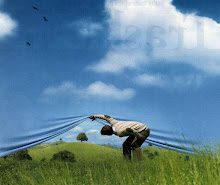–noun
1. Epistemology. the doctrine that all knowledge is limited to experiences by the self, and that transcendent knowledge is impossible.
(Ethical half of dictionary.com's definition of subjectivism excluding for irrelevance.)
~~~~~~~
The world is organized in a certain way. One’s initial inclination, in many cases, is to deny such a premise—the incredible perplexity of the world paired with a great diversity of opinion creates a sense of dubiousness about the human ability to reason. I know in my own experiences that frustration seizes the forefront when treading the wide range of possible explanations for any given phenomena. But does this impression rob us of the ability to find truth? And if so, in what areas?
Firstly, we can begin with an easy one, the natural world. Remember the desk (Sink counter? Ledge? I don’t know, whatever that thing is, you know what I’m talking about) Professor Johnson stands behind during class? There is little doubt to be had about its existence. We all see it, we can all mutually agree on its presence even if our perception of it varies (and variations will be minor—we aren’t doing anything but identifying its existence), and we can generally agree, as it exists among us and we can perform tests to ensure this, that it exists.
Is it so much of a jump to apply such a method to the natural world? It is obvious what I’m getting at now, the rub is science. While the word has a vast assortment of connotations by now, critical analysis (which here implies consideration for evidence, a recognition and discard of unsupported intuitions and careful consideration for facets) has perhaps less. When we perceive something in the natural world, we can first determine its existence, then its function, relation and components as part of our investigative analysis. I find it almost impossible to deny that there are a wide range of truths discovered and confirmed through this demanding critical analysis.
I am suggesting that science and its component of critical analysis acknowledges the ridiculously broad range of opinions in the world, and across centuries has bettered itself in the interest of finding the truth—by determining a set of criteria (evidence, testing, reason) that can whittle down the false. We all know an idiotic opinion when we hear one, and we can train ourselves to recognize even more.
This is no esoteric endeavor, either, as we are all imbued with such a tendency For example: you hear someone has transferred to another school from a person who is not always informed. You are initial skeptical due to this person’s dubious information, and then later, you see the aforementioned person in the quad. You hypothesize intuitively that they have not transferred, and by then asking them, and being told this is not the case, have confirmed your hypothesis as truth.
Blah blah blah, I am still not feeling that I am sufficiently clear. True, the natural world is an appealing target for this scientific approach, but what about the subjects we were discussing in class, the reason I am prattling in the first place? Instead of going with my natural inclination right now and listing what I think, I am only going to suggest that during the class, we try and transpose the access to truths that critical/scientific thinking provides about the natural world onto the subjects at hand.
We may very well find, as scientists did when trying to unearth the natural world, that the diversity of opinion is inevitable, but is incapable of rendering truth subjective. Is it so hard to believe, considering that so many things in the universe can be whittled down to one accurate fact, that the same can be found among more contentious topics? Certainly the mutating aspect of human nature will play a role, but I have never found a question rendered impossible to resolve by too many false answers, only questions that have yet to receive a correct answer. Without critical analysis, the shrug and the “who can say” approach will get tedious quickly. I look forward to seeing what truths (whatever they are) we can derive.
And I apologize to anyone I interrupted in class. It is an unfortunate tendency of mine and I hope I did not offend; my eagerness precedes me too often.
Monday, September 8, 2008
Subscribe to:
Post Comments (Atom)

No comments:
Post a Comment